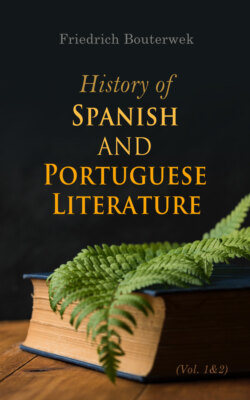Читать книгу History of Spanish and Portuguese Literature (Vol. 1&2) - Friedrich Bouterwek - Страница 46
На сайте Литреса книга снята с продажи.
SPANISH CRITICISM DURING THE PERIOD OF THIS SECTION.
ОглавлениеTable of Contents
It would scarcely be worth while to say any thing relative to Spanish criticism during the period this section embraces, were it not that among the books of instruction on poetry and rhetoric which then appeared, there was one, which besides being extraordinary for the age in which it was produced, may be regarded as the first of its kind in modern literature. It is entitled, the Philosophy of the Ancient Style of Poetry, which in Spanish is somewhat fantastically expressed, Philosophia Antigua Poetica. This work is the production of Alonzo Lopez Pinciano, physician to Charles V. who as has been mentioned, was likewise the author of an unsuccessful heroic poem.328 Though Pinciano possessed few qualifications for a poet, he had nevertheless conceived the idea of writing an Art of Poetry, which should be something more than a mere introduction to versification and instructions relative to correct and figurative expression. Speculations on the elements of poetry constituted his chief occupation, when relieved from the duties of his profession. He had so carefully studied Aristotle’s Art of Poetry, and so attentively compared it with the other writings of the same author, that of all the admirers of that work, he was probably the first who discovered its imperfection. He says—“what is called Aristotle’s Art of Poetry cannot, if rightly understood, be regarded in any other light than as a fragment; for Aristotle, in various passages of his other works, refers to a second part of this Art of Poetry, which is lost.” Pinciano’s conjectures respecting the contents of the lost part, and its connection with the fragment now existing, have, it is true, been contradicted by more modern critics; but this physician was nevertheless the first to observe that imperfection which had escaped the notice of all previous philologists and commentators on Aristotle. He remarks, that the philologists and commentators have written very learned works; which, however, are as imperfect as the text which they elucidate. With the view of restoring poetry to its ancient dignity, and establishing and developing its true spirit, Lopez Pinciano commences with an Analysis of the Wants of Human Nature. He treats minutely of the senses, of the affections, the faculties of the soul, wisdom, and the pleasures peculiar to cultivated minds, but always with reference to the works of Aristotle, whom, like other writers of that age, he merely designates by the title of the philosopher. Like Aristotle, he makes imitation the essence of poetry; but with a particular and more precise definition of what in his opinion constitutes poetic imitation. He then enters upon reflections concerning poetic language, and gives a detailed theory of the several kinds of poetry. The present, however, is not the proper place to present an explanation of this theory. Whenever Lopez Pinciano abandons Aristotle, his notions respecting the different poetic styles are as confused as those of his contemporaries; and only a few of his notions and distinctions can be deemed of importance at the present day. But his name is deserving of honourable remembrance, for he was the first writer of modern times who endeavoured to establish a philosophic art of poetry; and with all his veneration for Aristotle, he was the first scholar who ventured to think for himself, and to go somewhat further than his master. He also evinced a laudable perseverance in the execution of his task. Pinciano’s learned and ingenious work was not quite so useful as it might have been, owing in a great measure to its artificial and formal manner of composition, which, however, the author considered singularly easy and natural. This Art of Poetry is written in the form of letters, (which was in itself a novelty at that age), and in these letters, conversations are occasionally introduced. The friend who answers, invariably gives an abstract of the letter he has last received, as a proof that he understands its contents and its object. Lopez Pinciano, however, cannot be regarded as a model in epistolary and conversational prose any more than in poetry.
The authors of the other arts of poetry which appeared about this time in the Spanish language, merely confined themselves to the explanation of metrical forms and the establishment of subordinate principles. Among these authors were Sanchez de Viena, Geronymo de Mondragon, and Juan Diaz.329 An Art of Poetry of the same description in verse, by Juan de la Cueva, has already been mentioned. From a philosophic treatise of this kind, Spanish poetry could derive no advantage, unless its origin had been totally different from what it really was. Theories, even the most popular, can contribute only in a very slight degree to the formation of the poetic genius, either of nations or individuals.
Several works on the art of rhetoric, in which the principles of Aristotle were followed, appeared about this time in Spain; but they produced nothing valuable with respect to theory, and exercised no remarkable influence on the improvement of Spanish prose.
